Critical Analysis of Approaches to Early Childhood Education
VerifiedAdded on 2022/08/14
|7
|1766
|20
Essay
AI Summary
This essay provides a critical analysis of various approaches to early childhood education, examining the perspectives of theorists like Reggio Emilia, the forest school model, and progressive education. It delves into the societal and historical framing of the concept of a 'child' and explores relevant theoretical perspectives, including Piaget, Vygotsky, and Kolb's experimental learning theory. The paper further investigates the influence of these approaches on frameworks such as EYLF and VELYDF, assessing their impact on shaping early childhood education. The analysis covers the innovative aspects of the Reggio Emilia approach, the benefits of the forest school concept, and the goals of progressive education. The conclusion highlights the alignment of Australian educational curricula with these approaches, while acknowledging variations and potential ambiguities.
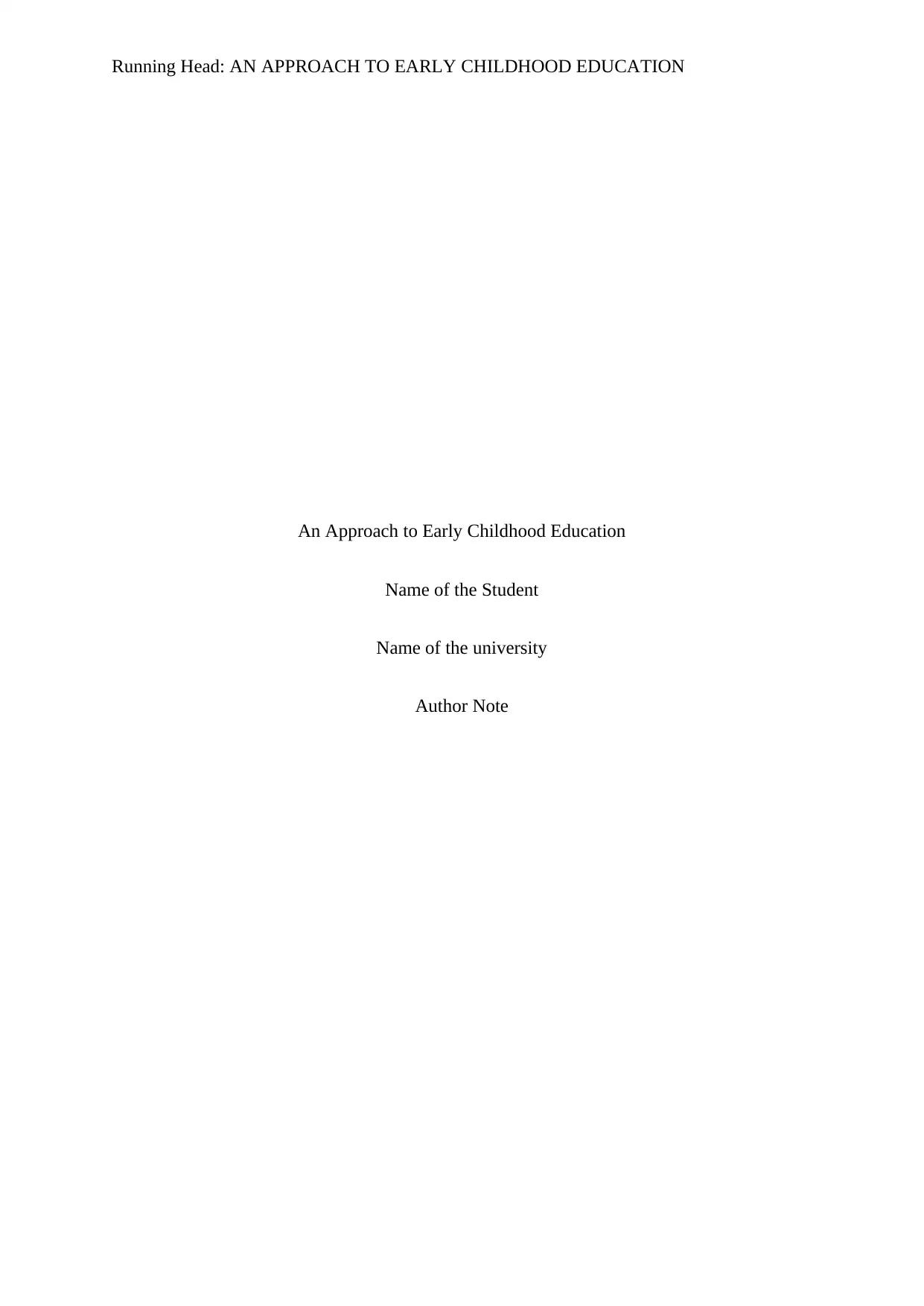
Running Head: AN APPROACH TO EARLY CHILDHOOD EDUCATION
An Approach to Early Childhood Education
Name of the Student
Name of the university
Author Note
An Approach to Early Childhood Education
Name of the Student
Name of the university
Author Note
Paraphrase This Document
Need a fresh take? Get an instant paraphrase of this document with our AI Paraphraser
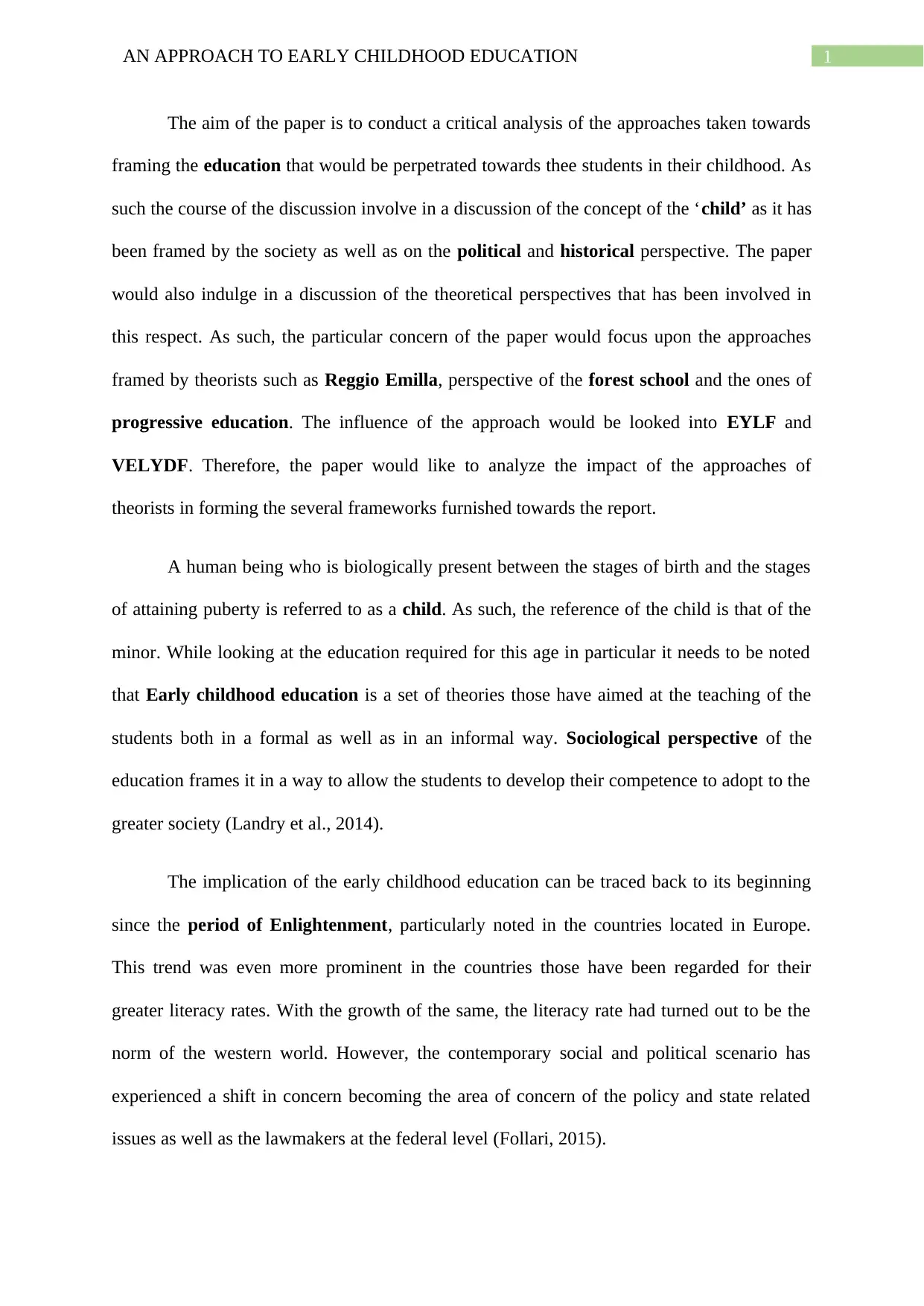
1AN APPROACH TO EARLY CHILDHOOD EDUCATION
The aim of the paper is to conduct a critical analysis of the approaches taken towards
framing the education that would be perpetrated towards thee students in their childhood. As
such the course of the discussion involve in a discussion of the concept of the ‘child’ as it has
been framed by the society as well as on the political and historical perspective. The paper
would also indulge in a discussion of the theoretical perspectives that has been involved in
this respect. As such, the particular concern of the paper would focus upon the approaches
framed by theorists such as Reggio Emilla, perspective of the forest school and the ones of
progressive education. The influence of the approach would be looked into EYLF and
VELYDF. Therefore, the paper would like to analyze the impact of the approaches of
theorists in forming the several frameworks furnished towards the report.
A human being who is biologically present between the stages of birth and the stages
of attaining puberty is referred to as a child. As such, the reference of the child is that of the
minor. While looking at the education required for this age in particular it needs to be noted
that Early childhood education is a set of theories those have aimed at the teaching of the
students both in a formal as well as in an informal way. Sociological perspective of the
education frames it in a way to allow the students to develop their competence to adopt to the
greater society (Landry et al., 2014).
The implication of the early childhood education can be traced back to its beginning
since the period of Enlightenment, particularly noted in the countries located in Europe.
This trend was even more prominent in the countries those have been regarded for their
greater literacy rates. With the growth of the same, the literacy rate had turned out to be the
norm of the western world. However, the contemporary social and political scenario has
experienced a shift in concern becoming the area of concern of the policy and state related
issues as well as the lawmakers at the federal level (Follari, 2015).
The aim of the paper is to conduct a critical analysis of the approaches taken towards
framing the education that would be perpetrated towards thee students in their childhood. As
such the course of the discussion involve in a discussion of the concept of the ‘child’ as it has
been framed by the society as well as on the political and historical perspective. The paper
would also indulge in a discussion of the theoretical perspectives that has been involved in
this respect. As such, the particular concern of the paper would focus upon the approaches
framed by theorists such as Reggio Emilla, perspective of the forest school and the ones of
progressive education. The influence of the approach would be looked into EYLF and
VELYDF. Therefore, the paper would like to analyze the impact of the approaches of
theorists in forming the several frameworks furnished towards the report.
A human being who is biologically present between the stages of birth and the stages
of attaining puberty is referred to as a child. As such, the reference of the child is that of the
minor. While looking at the education required for this age in particular it needs to be noted
that Early childhood education is a set of theories those have aimed at the teaching of the
students both in a formal as well as in an informal way. Sociological perspective of the
education frames it in a way to allow the students to develop their competence to adopt to the
greater society (Landry et al., 2014).
The implication of the early childhood education can be traced back to its beginning
since the period of Enlightenment, particularly noted in the countries located in Europe.
This trend was even more prominent in the countries those have been regarded for their
greater literacy rates. With the growth of the same, the literacy rate had turned out to be the
norm of the western world. However, the contemporary social and political scenario has
experienced a shift in concern becoming the area of concern of the policy and state related
issues as well as the lawmakers at the federal level (Follari, 2015).
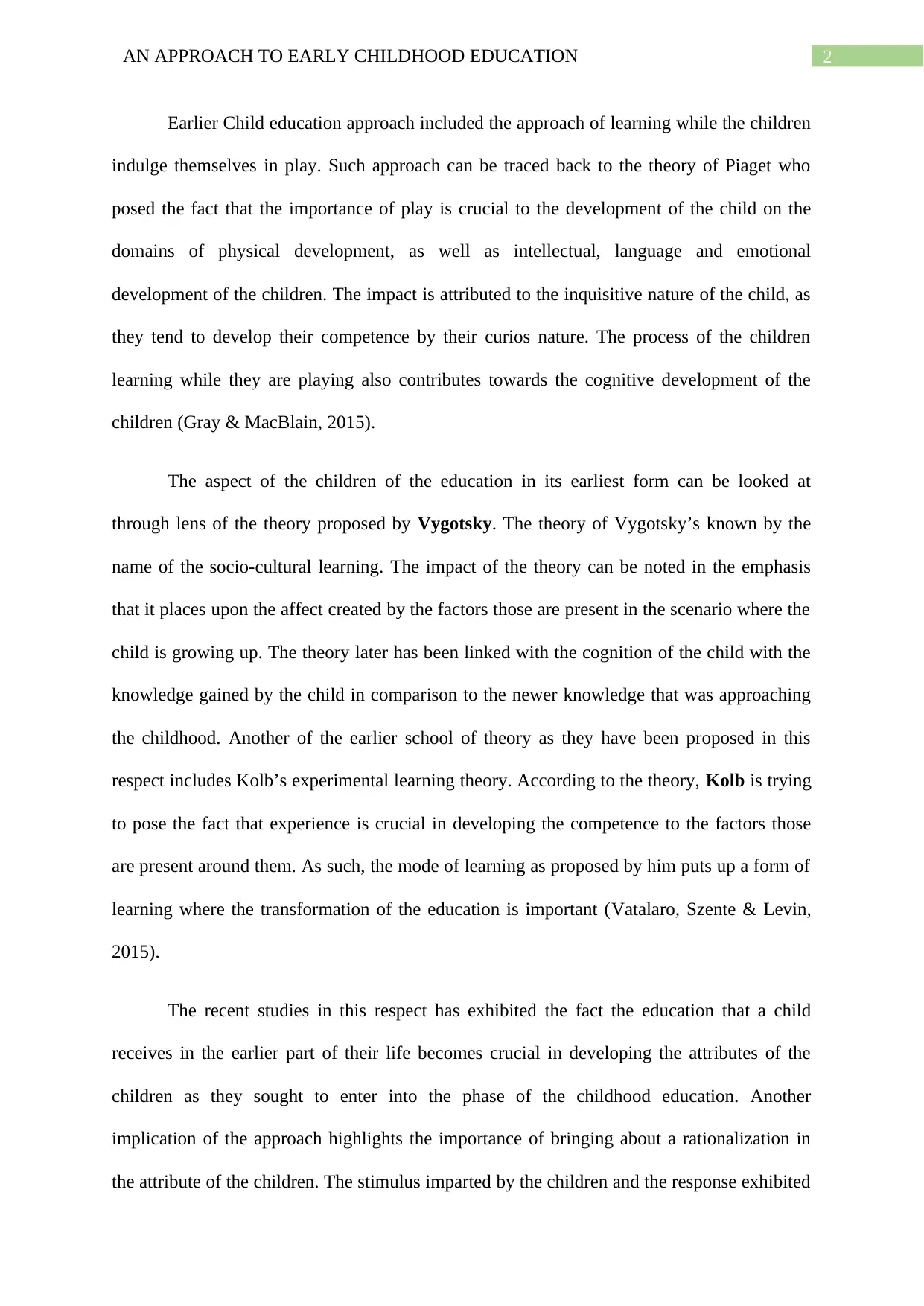
2AN APPROACH TO EARLY CHILDHOOD EDUCATION
Earlier Child education approach included the approach of learning while the children
indulge themselves in play. Such approach can be traced back to the theory of Piaget who
posed the fact that the importance of play is crucial to the development of the child on the
domains of physical development, as well as intellectual, language and emotional
development of the children. The impact is attributed to the inquisitive nature of the child, as
they tend to develop their competence by their curios nature. The process of the children
learning while they are playing also contributes towards the cognitive development of the
children (Gray & MacBlain, 2015).
The aspect of the children of the education in its earliest form can be looked at
through lens of the theory proposed by Vygotsky. The theory of Vygotsky’s known by the
name of the socio-cultural learning. The impact of the theory can be noted in the emphasis
that it places upon the affect created by the factors those are present in the scenario where the
child is growing up. The theory later has been linked with the cognition of the child with the
knowledge gained by the child in comparison to the newer knowledge that was approaching
the childhood. Another of the earlier school of theory as they have been proposed in this
respect includes Kolb’s experimental learning theory. According to the theory, Kolb is trying
to pose the fact that experience is crucial in developing the competence to the factors those
are present around them. As such, the mode of learning as proposed by him puts up a form of
learning where the transformation of the education is important (Vatalaro, Szente & Levin,
2015).
The recent studies in this respect has exhibited the fact the education that a child
receives in the earlier part of their life becomes crucial in developing the attributes of the
children as they sought to enter into the phase of the childhood education. Another
implication of the approach highlights the importance of bringing about a rationalization in
the attribute of the children. The stimulus imparted by the children and the response exhibited
Earlier Child education approach included the approach of learning while the children
indulge themselves in play. Such approach can be traced back to the theory of Piaget who
posed the fact that the importance of play is crucial to the development of the child on the
domains of physical development, as well as intellectual, language and emotional
development of the children. The impact is attributed to the inquisitive nature of the child, as
they tend to develop their competence by their curios nature. The process of the children
learning while they are playing also contributes towards the cognitive development of the
children (Gray & MacBlain, 2015).
The aspect of the children of the education in its earliest form can be looked at
through lens of the theory proposed by Vygotsky. The theory of Vygotsky’s known by the
name of the socio-cultural learning. The impact of the theory can be noted in the emphasis
that it places upon the affect created by the factors those are present in the scenario where the
child is growing up. The theory later has been linked with the cognition of the child with the
knowledge gained by the child in comparison to the newer knowledge that was approaching
the childhood. Another of the earlier school of theory as they have been proposed in this
respect includes Kolb’s experimental learning theory. According to the theory, Kolb is trying
to pose the fact that experience is crucial in developing the competence to the factors those
are present around them. As such, the mode of learning as proposed by him puts up a form of
learning where the transformation of the education is important (Vatalaro, Szente & Levin,
2015).
The recent studies in this respect has exhibited the fact the education that a child
receives in the earlier part of their life becomes crucial in developing the attributes of the
children as they sought to enter into the phase of the childhood education. Another
implication of the approach highlights the importance of bringing about a rationalization in
the attribute of the children. The stimulus imparted by the children and the response exhibited
⊘ This is a preview!⊘
Do you want full access?
Subscribe today to unlock all pages.

Trusted by 1+ million students worldwide
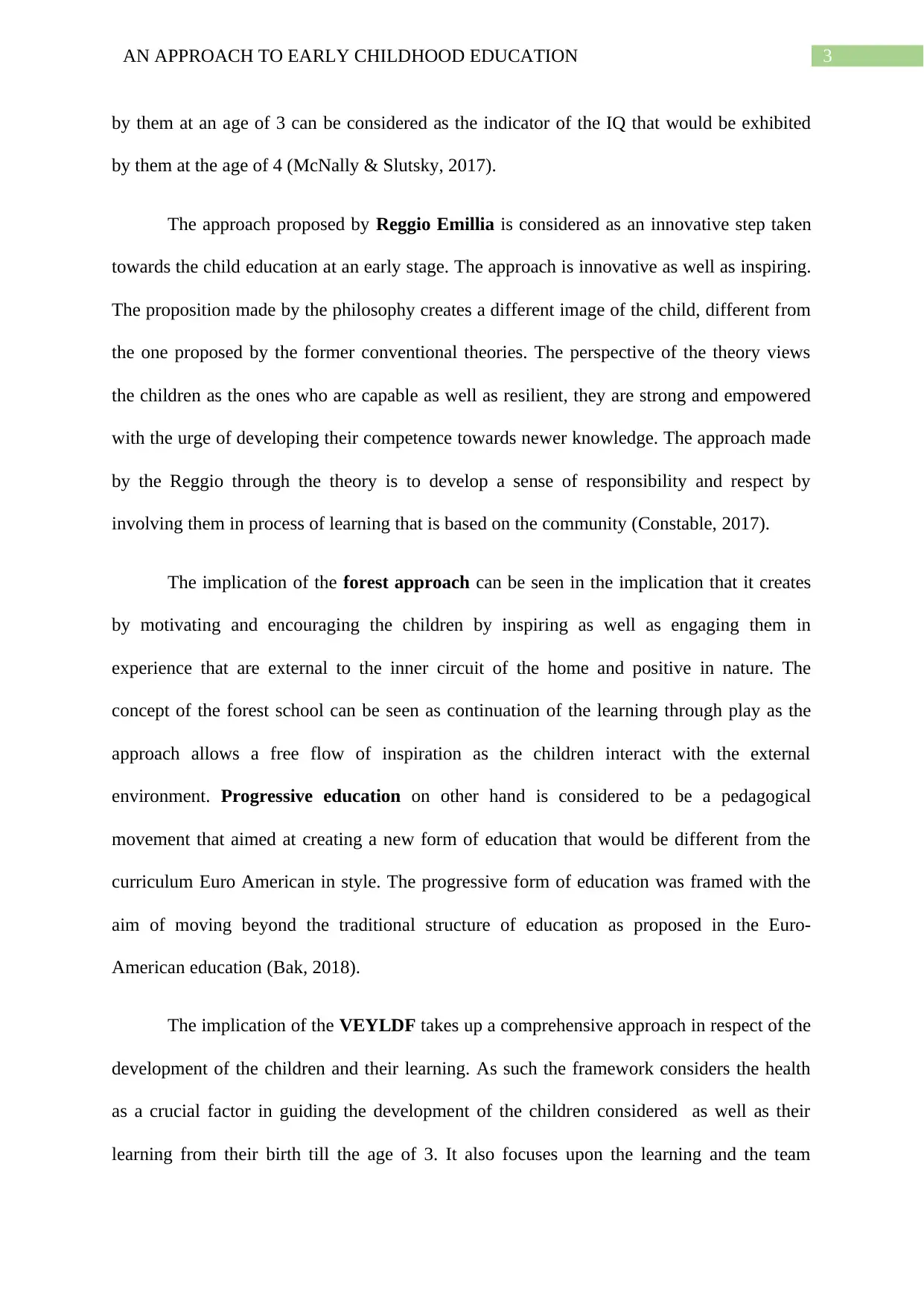
3AN APPROACH TO EARLY CHILDHOOD EDUCATION
by them at an age of 3 can be considered as the indicator of the IQ that would be exhibited
by them at the age of 4 (McNally & Slutsky, 2017).
The approach proposed by Reggio Emillia is considered as an innovative step taken
towards the child education at an early stage. The approach is innovative as well as inspiring.
The proposition made by the philosophy creates a different image of the child, different from
the one proposed by the former conventional theories. The perspective of the theory views
the children as the ones who are capable as well as resilient, they are strong and empowered
with the urge of developing their competence towards newer knowledge. The approach made
by the Reggio through the theory is to develop a sense of responsibility and respect by
involving them in process of learning that is based on the community (Constable, 2017).
The implication of the forest approach can be seen in the implication that it creates
by motivating and encouraging the children by inspiring as well as engaging them in
experience that are external to the inner circuit of the home and positive in nature. The
concept of the forest school can be seen as continuation of the learning through play as the
approach allows a free flow of inspiration as the children interact with the external
environment. Progressive education on other hand is considered to be a pedagogical
movement that aimed at creating a new form of education that would be different from the
curriculum Euro American in style. The progressive form of education was framed with the
aim of moving beyond the traditional structure of education as proposed in the Euro-
American education (Bak, 2018).
The implication of the VEYLDF takes up a comprehensive approach in respect of the
development of the children and their learning. As such the framework considers the health
as a crucial factor in guiding the development of the children considered as well as their
learning from their birth till the age of 3. It also focuses upon the learning and the team
by them at an age of 3 can be considered as the indicator of the IQ that would be exhibited
by them at the age of 4 (McNally & Slutsky, 2017).
The approach proposed by Reggio Emillia is considered as an innovative step taken
towards the child education at an early stage. The approach is innovative as well as inspiring.
The proposition made by the philosophy creates a different image of the child, different from
the one proposed by the former conventional theories. The perspective of the theory views
the children as the ones who are capable as well as resilient, they are strong and empowered
with the urge of developing their competence towards newer knowledge. The approach made
by the Reggio through the theory is to develop a sense of responsibility and respect by
involving them in process of learning that is based on the community (Constable, 2017).
The implication of the forest approach can be seen in the implication that it creates
by motivating and encouraging the children by inspiring as well as engaging them in
experience that are external to the inner circuit of the home and positive in nature. The
concept of the forest school can be seen as continuation of the learning through play as the
approach allows a free flow of inspiration as the children interact with the external
environment. Progressive education on other hand is considered to be a pedagogical
movement that aimed at creating a new form of education that would be different from the
curriculum Euro American in style. The progressive form of education was framed with the
aim of moving beyond the traditional structure of education as proposed in the Euro-
American education (Bak, 2018).
The implication of the VEYLDF takes up a comprehensive approach in respect of the
development of the children and their learning. As such the framework considers the health
as a crucial factor in guiding the development of the children considered as well as their
learning from their birth till the age of 3. It also focuses upon the learning and the team
Paraphrase This Document
Need a fresh take? Get an instant paraphrase of this document with our AI Paraphraser
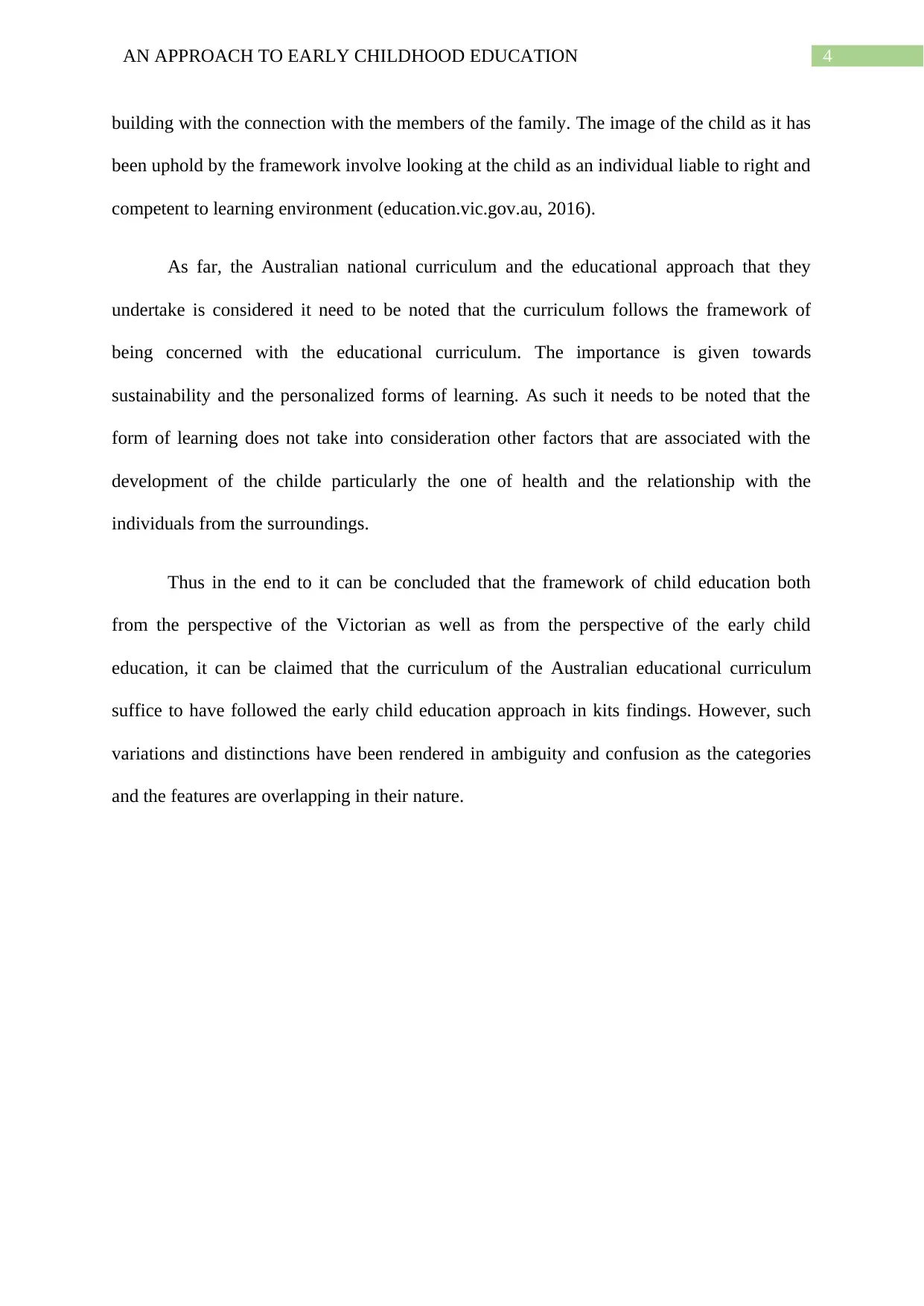
4AN APPROACH TO EARLY CHILDHOOD EDUCATION
building with the connection with the members of the family. The image of the child as it has
been uphold by the framework involve looking at the child as an individual liable to right and
competent to learning environment (education.vic.gov.au, 2016).
As far, the Australian national curriculum and the educational approach that they
undertake is considered it need to be noted that the curriculum follows the framework of
being concerned with the educational curriculum. The importance is given towards
sustainability and the personalized forms of learning. As such it needs to be noted that the
form of learning does not take into consideration other factors that are associated with the
development of the childe particularly the one of health and the relationship with the
individuals from the surroundings.
Thus in the end to it can be concluded that the framework of child education both
from the perspective of the Victorian as well as from the perspective of the early child
education, it can be claimed that the curriculum of the Australian educational curriculum
suffice to have followed the early child education approach in kits findings. However, such
variations and distinctions have been rendered in ambiguity and confusion as the categories
and the features are overlapping in their nature.
building with the connection with the members of the family. The image of the child as it has
been uphold by the framework involve looking at the child as an individual liable to right and
competent to learning environment (education.vic.gov.au, 2016).
As far, the Australian national curriculum and the educational approach that they
undertake is considered it need to be noted that the curriculum follows the framework of
being concerned with the educational curriculum. The importance is given towards
sustainability and the personalized forms of learning. As such it needs to be noted that the
form of learning does not take into consideration other factors that are associated with the
development of the childe particularly the one of health and the relationship with the
individuals from the surroundings.
Thus in the end to it can be concluded that the framework of child education both
from the perspective of the Victorian as well as from the perspective of the early child
education, it can be claimed that the curriculum of the Australian educational curriculum
suffice to have followed the early child education approach in kits findings. However, such
variations and distinctions have been rendered in ambiguity and confusion as the categories
and the features are overlapping in their nature.
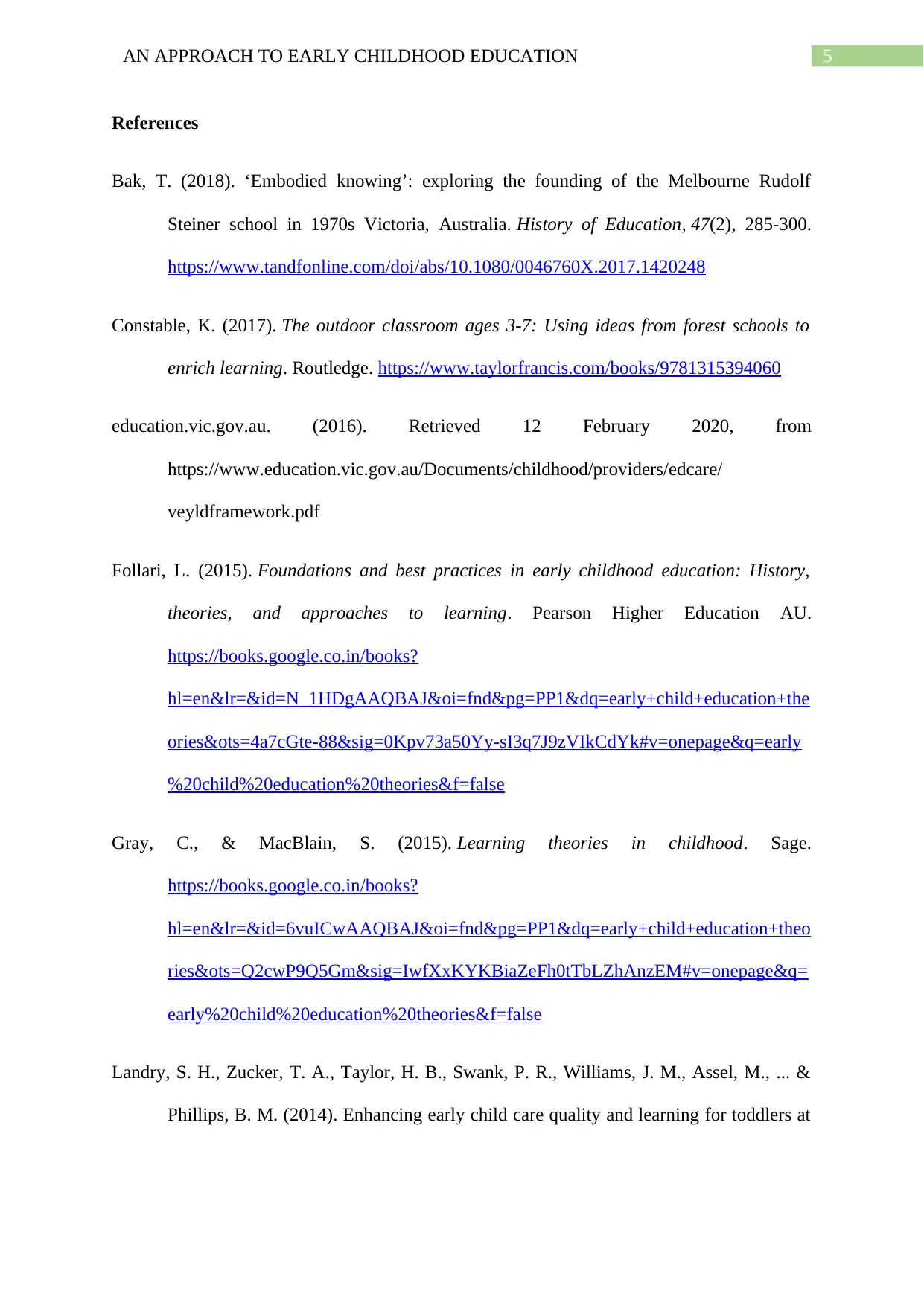
5AN APPROACH TO EARLY CHILDHOOD EDUCATION
References
Bak, T. (2018). ‘Embodied knowing’: exploring the founding of the Melbourne Rudolf
Steiner school in 1970s Victoria, Australia. History of Education, 47(2), 285-300.
https://www.tandfonline.com/doi/abs/10.1080/0046760X.2017.1420248
Constable, K. (2017). The outdoor classroom ages 3-7: Using ideas from forest schools to
enrich learning. Routledge. https://www.taylorfrancis.com/books/9781315394060
education.vic.gov.au. (2016). Retrieved 12 February 2020, from
https://www.education.vic.gov.au/Documents/childhood/providers/edcare/
veyldframework.pdf
Follari, L. (2015). Foundations and best practices in early childhood education: History,
theories, and approaches to learning. Pearson Higher Education AU.
https://books.google.co.in/books?
hl=en&lr=&id=N_1HDgAAQBAJ&oi=fnd&pg=PP1&dq=early+child+education+the
ories&ots=4a7cGte-88&sig=0Kpv73a50Yy-sI3q7J9zVIkCdYk#v=onepage&q=early
%20child%20education%20theories&f=false
Gray, C., & MacBlain, S. (2015). Learning theories in childhood. Sage.
https://books.google.co.in/books?
hl=en&lr=&id=6vuICwAAQBAJ&oi=fnd&pg=PP1&dq=early+child+education+theo
ries&ots=Q2cwP9Q5Gm&sig=IwfXxKYKBiaZeFh0tTbLZhAnzEM#v=onepage&q=
early%20child%20education%20theories&f=false
Landry, S. H., Zucker, T. A., Taylor, H. B., Swank, P. R., Williams, J. M., Assel, M., ... &
Phillips, B. M. (2014). Enhancing early child care quality and learning for toddlers at
References
Bak, T. (2018). ‘Embodied knowing’: exploring the founding of the Melbourne Rudolf
Steiner school in 1970s Victoria, Australia. History of Education, 47(2), 285-300.
https://www.tandfonline.com/doi/abs/10.1080/0046760X.2017.1420248
Constable, K. (2017). The outdoor classroom ages 3-7: Using ideas from forest schools to
enrich learning. Routledge. https://www.taylorfrancis.com/books/9781315394060
education.vic.gov.au. (2016). Retrieved 12 February 2020, from
https://www.education.vic.gov.au/Documents/childhood/providers/edcare/
veyldframework.pdf
Follari, L. (2015). Foundations and best practices in early childhood education: History,
theories, and approaches to learning. Pearson Higher Education AU.
https://books.google.co.in/books?
hl=en&lr=&id=N_1HDgAAQBAJ&oi=fnd&pg=PP1&dq=early+child+education+the
ories&ots=4a7cGte-88&sig=0Kpv73a50Yy-sI3q7J9zVIkCdYk#v=onepage&q=early
%20child%20education%20theories&f=false
Gray, C., & MacBlain, S. (2015). Learning theories in childhood. Sage.
https://books.google.co.in/books?
hl=en&lr=&id=6vuICwAAQBAJ&oi=fnd&pg=PP1&dq=early+child+education+theo
ries&ots=Q2cwP9Q5Gm&sig=IwfXxKYKBiaZeFh0tTbLZhAnzEM#v=onepage&q=
early%20child%20education%20theories&f=false
Landry, S. H., Zucker, T. A., Taylor, H. B., Swank, P. R., Williams, J. M., Assel, M., ... &
Phillips, B. M. (2014). Enhancing early child care quality and learning for toddlers at
⊘ This is a preview!⊘
Do you want full access?
Subscribe today to unlock all pages.

Trusted by 1+ million students worldwide
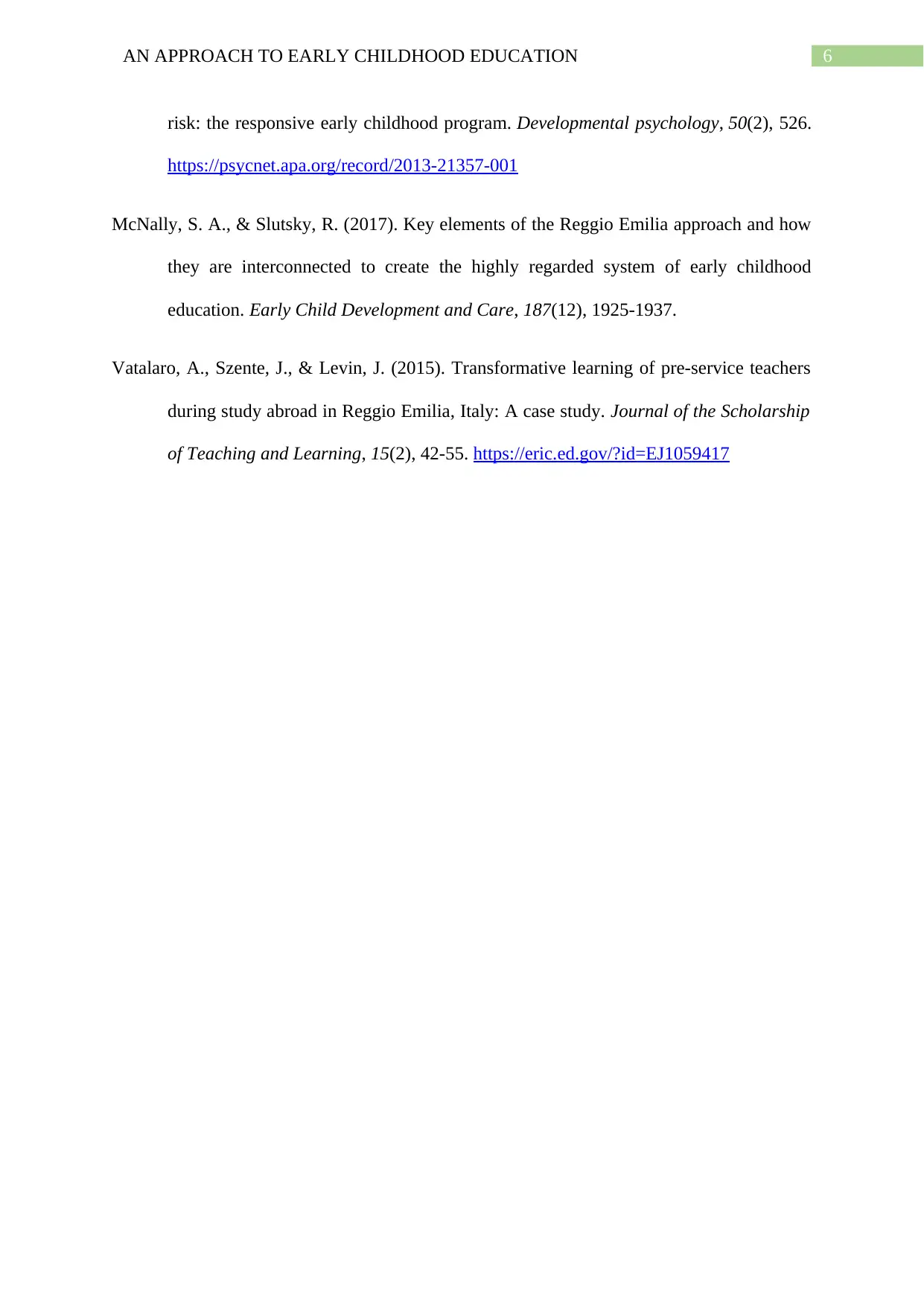
6AN APPROACH TO EARLY CHILDHOOD EDUCATION
risk: the responsive early childhood program. Developmental psychology, 50(2), 526.
https://psycnet.apa.org/record/2013-21357-001
McNally, S. A., & Slutsky, R. (2017). Key elements of the Reggio Emilia approach and how
they are interconnected to create the highly regarded system of early childhood
education. Early Child Development and Care, 187(12), 1925-1937.
Vatalaro, A., Szente, J., & Levin, J. (2015). Transformative learning of pre-service teachers
during study abroad in Reggio Emilia, Italy: A case study. Journal of the Scholarship
of Teaching and Learning, 15(2), 42-55. https://eric.ed.gov/?id=EJ1059417
risk: the responsive early childhood program. Developmental psychology, 50(2), 526.
https://psycnet.apa.org/record/2013-21357-001
McNally, S. A., & Slutsky, R. (2017). Key elements of the Reggio Emilia approach and how
they are interconnected to create the highly regarded system of early childhood
education. Early Child Development and Care, 187(12), 1925-1937.
Vatalaro, A., Szente, J., & Levin, J. (2015). Transformative learning of pre-service teachers
during study abroad in Reggio Emilia, Italy: A case study. Journal of the Scholarship
of Teaching and Learning, 15(2), 42-55. https://eric.ed.gov/?id=EJ1059417
1 out of 7
Related Documents
Your All-in-One AI-Powered Toolkit for Academic Success.
+13062052269
info@desklib.com
Available 24*7 on WhatsApp / Email
![[object Object]](/_next/static/media/star-bottom.7253800d.svg)
Unlock your academic potential
Copyright © 2020–2026 A2Z Services. All Rights Reserved. Developed and managed by ZUCOL.





